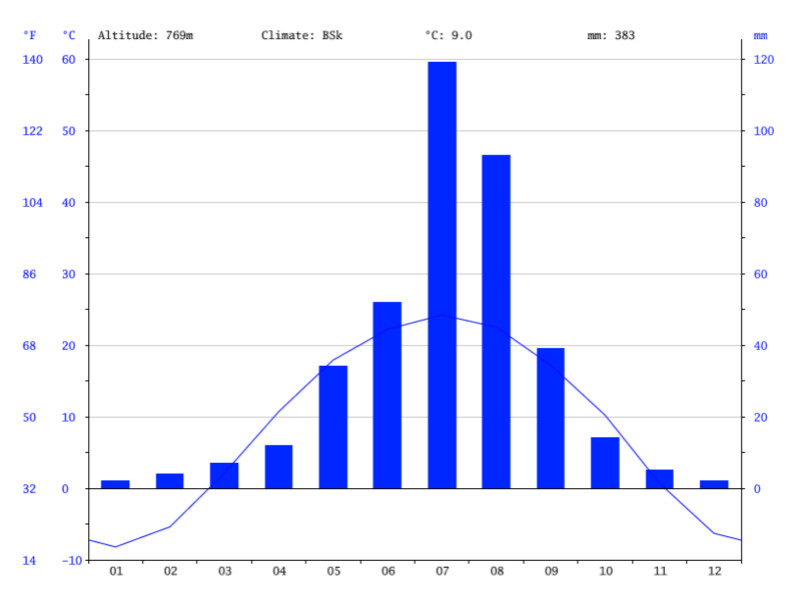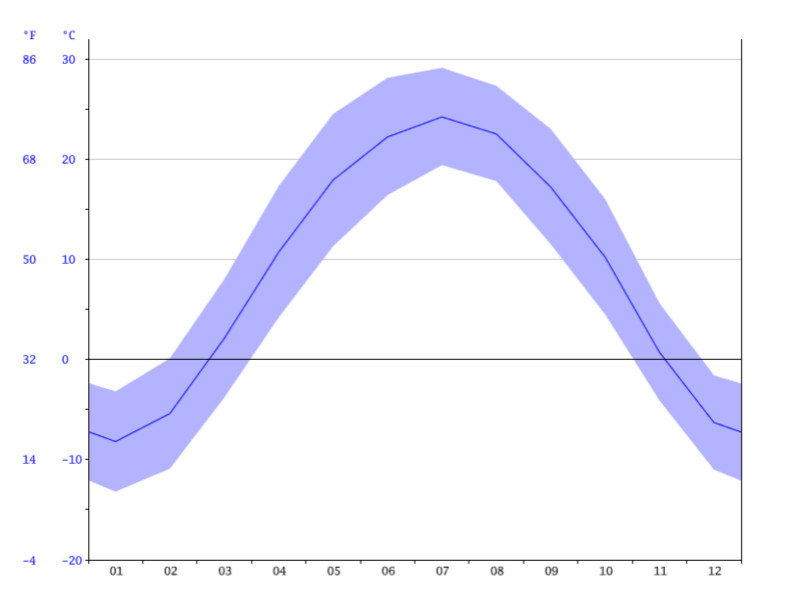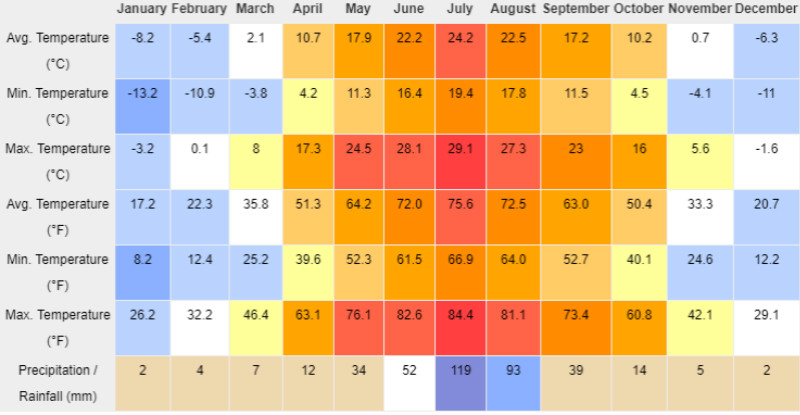
Zhangjiakou Climate
Zhangjiakou Weather and Climate for 2022 Winter Olympics describes information with temperature, precipitation, Geography, What Clothes to Wear in Zhangjiakou, weather and climate by month, climate graph, 15 days Zhangjiakou weather forecast. Find out the best time to visit Zhangjiakou and see the season highlights in Zhangjiakou. It also tells you what to wear in different seasons and Clothes packing for Your Trip to Zhangjiakou during 2022 Winter Olympics.
Zhangjiakou Climate & Weather
Zhangjiakou has a temperate continental monsoon climate. Its climate features are as follows: four distinct seasons in a year; cold and long winter; dry and windy with sand in spring; hot and short summer with concentrated precipitation; clear and cool autumn. Bashang area(坝上地区) is rich in light resources with large temperature difference between day and night; rain and heat are in the same season, and the climate is cool in the growing season; there is little hot and humid weather. The annual precipitation is 330-400mm.
Zhangjiakou Weather Graph by Month
 The driest month is January, with 2 mm of rain. The greatest amount of precipitation occurs in July, with an average of 119 mm.
The driest month is January, with 2 mm of rain. The greatest amount of precipitation occurs in July, with an average of 119 mm.
Zhangjiakou Average Temperature
 July is the warmest month of the year. The temperature in July averages 24.2 °C. The lowest average temperatures in the year occur in January, when it is around -8.2 °C.
July is the warmest month of the year. The temperature in July averages 24.2 °C. The lowest average temperatures in the year occur in January, when it is around -8.2 °C.
Zhangjiakou Weather by Month
 There is a difference of 117 mm of precipitation between the driest and wettest months. The variation in temperatures throughout the year is 32.4 °C.
There is a difference of 117 mm of precipitation between the driest and wettest months. The variation in temperatures throughout the year is 32.4 °C.
Zhangjiakou Climate by Month
Best Time to Visit Zhangjiakou
Zhangjiakou is the host city of 2022 Beijing Winter Olympic Games and also a tourist city. So when is the best time to visit? There are three seasons:
- At this time of July and August, the season with the largest number of tourists, flowers bloom and grass grow green, stretching as far as the eye can see, with many tourists and crowded vehicles. This is the peak tourist season. It's a good place to enjoy the cool with the temperature of about 20 degrees.
- Autumn from September to November is the most comfortable season. Some trees turn gold and red, while others remain green, creating a dreamy natural scene.
- In winter, Zhangjiakou is covered with snow, which is a scenery of northern China. It has several feet of snow on the mountain and is a natural resort for skiing tourism. Chongli and Chicheng have the largest natural ski resorts in North China. So it's a good place to enjoy the winter sports.
More about Best Time to Visit Zhangjiakou.
Four Seasons of Zhangjiakou & What to Wear
Spring (March-May)
Spring starts from March to May. Due to the combination of moisture and temperature, the temperature is moderate, ranging from 4℃ to 27℃. It seldom rains. It rains 2 to 4 days a month. However, the wind is strong and frequent. According to statistics, due to the complex topography of Zhangjiakou, about 40% of the strong wind will occur in spring.
It is recommended to wear warm clothing such as suits and thin sweaters. In addition, you'd better put on protective clothing, such as masks, hats and glasses, to protect your skin and eyes, as well as bring some body lotion, such as baby oil and vaseline to prevent skin cracking.
Summer(June-August)
Summer from June to August is the hottest season. However, most of the time the temperature is mild and comfortable, with an average temperature of 18 to 30℃. This is the season with the most rainfall, usually 7 or 8 days a month. Every year at the end of July, the grassy grassland will welcome a rock feast. These people who love rock music are waiting for the Zhangbei Grassland Music Festival to bring an audio-visual feast.
It is recommended to wear cool and breathable clothes, such as cotton and linen shirts, thin skirts, t-shirts, as well as rain gear.
Autumn(September - November)
Autumn from September to November is the most comfortable season. The weather is cool, the air is clear, and there are several days of rain and wind. The daily maximum temperature is between 2.6℃ and 25.1℃. Some trees turn gold and red, while others remain green, creating a dreamy natural scene.
It's suitable to wear short suits, thin denim shirts and trousers and casual clothes.
Winter(December to February)
Winter is cold from December to February, with the highest temperature being about 4℃. On most nights, the temperature is below freezing point. Little rain or snow makes the weather relatively dry. In winter, Zhangjiakou is covered with snow, which is a scenery of northern China. It has several feet of snow on the mountain and is a natural resort for skiing tourism. Chongli and Chicheng have the largest natural ski resorts in North China. So it's a good place to enjoy the winter sports.
It is recommended to wear thick warm clothes such as cotton-padded clothes, winter coats, tweed coats and down jackets. Wearing scarves, gloves and wool masks is also important.
What to Pack for Zhangjiakou Travel
- Rain Gear
The wind and rain on the grassland will come suddenly. It is suggested that you take your umbrella and raincoat with you and prepare a pair of shoes for rainy days. - Mosquito Spray
There are many mosquitoes on the grassland, so it is recommended to bring antipruritic, insect-resistant spray and other articles. - Sunscreen
If you go to Shijiazhuang in summer, sunscreen is also essential. If you want to go to places with high altitude and strong sunshine, such as air grassland, it is also recommended to do a good job in sunscreen. - Standing Drugs
When traveling, you should take some regular medicines, such as cold medicine, painkillers, carsickness medicine, essential balm, band-aid and so on. Tourists with hypertension, heart disease, diabetes, etc. please prepare drugs according to your own conditions. - Food and Drink
If you plan to drive on the Grass Skyline Scenic Road, it is recommended to bring sufficient food and drink supplies, because there are basically no shops and service areas along the road.













